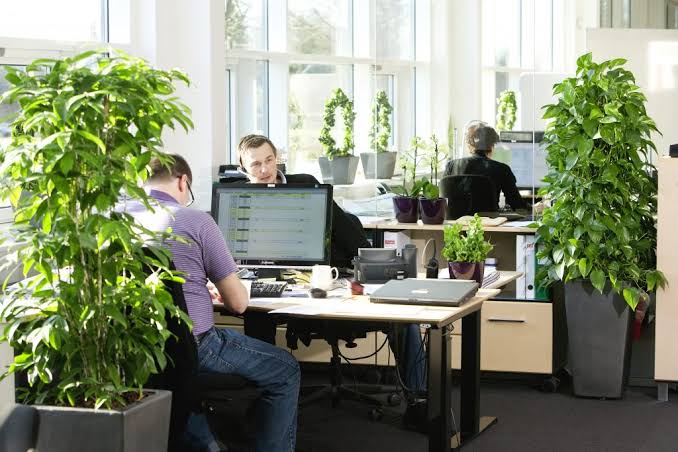Plants increase productivity
The more we gravitate toward the cities and hole up in our offices, the more we withdraw from nature and it’s largely unrecognized or unappreciated benefits. Studies have shown that the presence of potted plants, for example, improves productivity, creativity, performance and learning ability. In the case of schools, the presence of plants improved scores in mathematics spelling and science between 10% and 14%. Think what trees in the classroom might do!
Researchers have also found that plants act as vacuum cleaners removing pollution from the air. Exposure to indoor and outdoor pollutants in both home and offices has been linked to anxiety, depression, irritability, fatigue and short and long-term cognitive decline among other afflictions.
One study involved new computers, which have been shown to give off chemicals into the air. When a batch of new computers were hidden behind a divider, cognitive testing showed it reduced performance and increased errors by those workers closest to the hidden computers.
Plants not only give off oxygen, they are able to absorb environmental chemicals and transport them to the soil, rendering them less harmful. This is particularly true of trees, so if we don’t completely decimate our forests, they could be the answer to our air pollution problem. NASA used plants to keep their astronauts healthy while working in enclosed places constructed of synthetic materials. Potted plants have reduced indoor pollutants by at least 75%.
Natural lighting from the sun is another environmental factor that can affect our health and personal performance. It improves cognitive performance alertness and mood. This cannot be said of the artificial light of computer screens and TV sets. The artificial light adversely affects melatonin production and recent research links it to many health issues, including insomnia, immune deficits, cancers, obesity, daytime fatigue, depression, ADD, and others.
Light therapy studies, where blue-enriched white fluorescent tubes were installed, showed an improvement in mood, performance, alertness and so on. Not as good as working outdoors or near a window in the daytime, but it highlighted the importance of light for our health and well-being — which in turn affects our personal performance.
Of course, we can’t go backwards to our roots even if we wanted to – although in a way, I do envy people who live in the country. But we can use such information to modify our work environments.
For instance, I moved my home condo office from a windowless room that used to be a dining room to the solarium where I am surrounded by two walls of glass and access to the balcony. I am buying plants after having thrown them all out after my wife died less than two years ago, and in the Spring I am replacing her balcony window boxes that I trashed in the name of efficiency.
When I walk in the morning, In the Summer and Fall (we don’t have Spring in this part of Canada) I head through parkland that starts behind our condo building, winds around a pond and takes me to a little village with a coffee shop – where I do my most creative writing. The coffee shop has large windows and a great view of nature.
I buy organic fruit and vegetables, even though I know some of the labels may be misleading, and I make sure the cheese is from grazing cattle and the eggs from free-range hens. I avoid manufactured fats and stick to those from nature, and try to avoid all processed foods and fast foods.
Why this sudden interest in nature? I just read two fascinating books that provided all the above information and more: Your brain on nature by Eva Celhub and Alan Logan and Go wild: Free your body from the affliction of civilization by John J. Ratey and Richard Manning. And I recall the fun – and energy – I had as a youngster exploring the woods in my home town of Timmins, Ontario.


Recent Comments